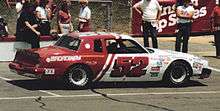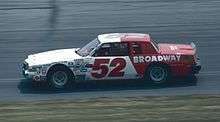Jimmy Means
| James "Jimmy" Means | |||||||
|---|---|---|---|---|---|---|---|
 Means' car in 1983 | |||||||
| Born |
May 29, 1950 Huntsville, Alabama, United States | ||||||
| NASCAR Sprint Cup Series career | |||||||
| 455 races run over 18 years | |||||||
| Best finish | 11th (1982) | ||||||
| First race | 1976 Daytona 500 (Daytona) | ||||||
| Last race | 1993 AC Delco 500 (Rockingham) | ||||||
| |||||||
| NASCAR Xfinity Series career | |||||||
| 3 races run over 1 year | |||||||
| Best finish | 65th (1989) | ||||||
| First race | 1989 Goody's 300 (Daytona) | ||||||
| Last race | 1989 Gatorade 200 (Darlington) | ||||||
| |||||||
| Statistics current as of December 25, 2012. | |||||||

James "Jimmy" Means (born May 29, 1950 in Huntsville, Alabama) is a retired American racing driver and owner, who competed in the Winston Cup Series as an owner/driver. He is currently an adviser for Front Row Motorsports and owns his own team, Means Racing.
He competed in NASCAR for eighteen years in mostly his own equipment, posting seventeen career top-tens. He made three career Busch Series starts in 1989, finishing 10th at Darlington Raceway. Following his retirement, Means worked as a crew chief in NASCAR, working for Bud Moore Engineering and Moy Racing. Means was part the Alabama Gang which included Bobby Allison, Donnie Allison, Neil Bonnett, Red Farmer, and Donnie Allison and later Davey Allison, Hut Stricklin, Steve Grissom and Mike Alexander. He is the father of Brad Means.
Local track career
Means won dozens of late model races in Alabama and Tennessee in the early '70s, including track championships at Huntsville Speedway and the historic Nashville Speedway USA.
Driving career
Means made his Cup debut in 1976 at the Daytona 500, driving the number 5 Chevrolet for Bill Gray. He led one lap but finished 40th after an engine failure. He ran an additional eighteen races for Gray in the number 52 car with sponsorship from WIXC, finishing in eleventh place twice. The following season, Means drove twenty-six races and had a career-best six top-ten finishes, but due to twelve DNFs, he only finished nineteenth in points.
In 1978, Means began running as an independent driver, except for the Winston 500, where he drove for Bill Champion. He had two top-tens but improved three spots to finish sixteenth in points. He received new sponsorship from Mr. Transmission, but only had one top-ten in 1979, forcing him to fall to 23rd in points. After a sponsorship change to Thompson Industries for 1980, Means failed to finish higher than 12th, but he was still able to move up to 17th in the standings. Broadway Motors became his new sponsor in 1981, and after two top-tens, he continued to move up to fourteenth in points. In 1982, he was able to garner an additional pair of ninth-place runs, and finished a career-best 11th in points. It also marked the first time in his career he ran every race on the schedule.
Means had the highest finish of his career in 1983, when he had a seventh-place run at Talladega. Combined with two other top-tens, he dropped seven spots in the standings. During the 1984, Means suffered injuries in a crash at Talladega Superspeedway, forcing him to miss several races. He did not have a top-ten finish over the next two years, and he lost his Broadway sponsorship, picking up funding from Voyles Auto Savage in late 1986 NASCAR Winston Cup Series. He also switched his manufacturer to Pontiac.
In 1987, Eureka Vacuum Cleaners became Means' new sponsor, and he had the last top-ten of his career at Richmond International Raceway. He dropped to what was at the time the lowest points finish of his career (30th) in 1988, and continued to struggle in 1989, failing to qualify for several races and dropping another spot in the standings despite a new sponsor in Alka-Seltzer. Means had already chosen to skip two races in favor of Bobby Hillin, Jr. in 1991 after being involved with J. D. McDuffie's fatal crash; he continued to relinquish the ride to Mike Wallace at the end of the season.
After losing the Alka-Seltzer sponsorship, Means continued to drive a part-time schedule, posting only one top-ten finish. After getting part-time funding from NAPA and Hurley Limo, Means ran eighteen races in 1993.
Means had planned to race again in 1994 for his own team. Speedweeks 1994 was marred by the deaths of fellow Alabama driver Neil Bonnett, and Rodney Orr. The death of Bonnett convinced Means that he had no more reason to be racing. Jimmy Means announced his retirement in the days following qualifying for the 1994 Daytona 500. He was winless in 455 starts.
In 1995 he had a brief stint as team manager for the Bud Moore owned, Lake Speed driven #15 Ford Quality Care Thunderbird.
Jimmy Means' biggest fan of his racing career is Dale Earnhardt Jr. Earnhardt said he rooted for Means when Means was picked up by Hendrick Motorsports for a one-race deal in 1987. Earnhardt said he sobbed when Means wrecked early in the race. Earnhardt is also a best friend to Means' son. In 2011, Earnhardt loaned Means a car for his driver Bobby Santos to use after wrecking in practice for the season opening Daytona race.
Car owner

Means continues to own NASCAR cars through the 1990s and 2000s, primarily in the Busch Series (now Xfinity Series). In 2012, he was a part-owner of the new Hamilton Means Racing team, which fielded his traditional number 52.[1]
Motorsports career results
NASCAR
(key) (Bold – Pole position awarded by qualifying time. Italics – Pole position earned by points standings or practice time. * – Most laps led.)
Winston Cup Series
Daytona 500
| Year | Team | Manufacturer | Start | Finish |
|---|---|---|---|---|
| 1976 | Jimmy Means Racing | Chevrolet | 20 | 40 |
| 1977 | 23 | 8 | ||
| 1978 | 39 | 35 | ||
| 1979 | DNQ | |||
| 1980 | Buick | 26 | 15 | |
| 1981 | Pontiac | 26 | 21 | |
| 1982 | Buick | 40 | 17 | |
| 1983 | 42 | 14 | ||
| 1984 | Chevrolet | 41 | 17 | |
| 1985 | 25 | 14 | ||
| 1986 | Pontiac | 42 | 39 | |
| 1987 | 40 | 24 | ||
| 1988 | Chevrolet | 37 | 25 | |
| 1989 | Pontiac | DNQ | ||
| 1990 | 37 | 29 | ||
| 1991 | 39 | 39 | ||
| 1992 | DNQ | |||
Busch Series
| NASCAR Busch Series results | |||||||||||||||||||||||||||||||||||||||||
|---|---|---|---|---|---|---|---|---|---|---|---|---|---|---|---|---|---|---|---|---|---|---|---|---|---|---|---|---|---|---|---|---|---|---|---|---|---|---|---|---|---|
| Year | Team | No. | Make | 1 | 2 | 3 | 4 | 5 | 6 | 7 | 8 | 9 | 10 | 11 | 12 | 13 | 14 | 15 | 16 | 17 | 18 | 19 | 20 | 21 | 22 | 23 | 24 | 25 | 26 | 27 | 28 | 29 | NBSC | Pts | Ref | ||||||
| 1989 | Mac Martin Racing | 92 | Pontiac | DAY 30 |
CAR | MAR | HCY | DAR | BRI | NZH | SBO | LAN | NSV | CLT 30 |
DOV | ROU | LVL | VOL | MYB | SBO | HCY | DUB | IRP | ROU | BRI | DAR 10 |
RCH | DOV | MAR | CLT | CAR | MAR | 65th | 280 | [20] | ||||||
References
- ↑ Adamczyk, Jay (December 1, 2011). "Jayski's Nationwide Series Silly Season Site". Jayski.com. ESPN. Retrieved 2011-12-03.
- ↑ "Jimmy Means – 1976 NASCAR Winston Cup Results". Racing-Reference. Retrieved September 5, 2016.
- ↑ "Jimmy Means – 1977 NASCAR Winston Cup Results". Racing-Reference. Retrieved September 5, 2016.
- ↑ "Jimmy Means – 1978 NASCAR Winston Cup Results". Racing-Reference. Retrieved September 5, 2016.
- ↑ "Jimmy Means – 1979 NASCAR Winston Cup Results". Racing-Reference. Retrieved September 5, 2016.
- ↑ "Jimmy Means – 1980 NASCAR Winston Cup Results". Racing-Reference. Retrieved September 5, 2016.
- ↑ "Jimmy Means – 1981 NASCAR Winston Cup Results". Racing-Reference. Retrieved September 5, 2016.
- ↑ "Jimmy Means – 1982 NASCAR Winston Cup Results". Racing-Reference. Retrieved September 5, 2016.
- ↑ "Jimmy Means – 1983 NASCAR Winston Cup Results". Racing-Reference. Retrieved September 5, 2016.
- ↑ "Jimmy Means – 1984 NASCAR Winston Cup Results". Racing-Reference. Retrieved September 5, 2016.
- ↑ "Jimmy Means – 1985 NASCAR Winston Cup Results". Racing-Reference. Retrieved September 5, 2016.
- ↑ "Jimmy Means – 1986 NASCAR Winston Cup Results". Racing-Reference. Retrieved September 5, 2016.
- ↑ "Jimmy Means – 1987 NASCAR Winston Cup Results". Racing-Reference. Retrieved September 5, 2016.
- ↑ "Jimmy Means – 1988 NASCAR Winston Cup Results". Racing-Reference. Retrieved September 5, 2016.
- ↑ "Jimmy Means – 1989 NASCAR Winston Cup Results". Racing-Reference. Retrieved September 5, 2016.
- ↑ "Jimmy Means – 1990 NASCAR Winston Cup Results". Racing-Reference. Retrieved September 5, 2016.
- ↑ "Jimmy Means – 1991 NASCAR Winston Cup Results". Racing-Reference. Retrieved September 5, 2016.
- ↑ "Jimmy Means – 1992 NASCAR Winston Cup Results". Racing-Reference. Retrieved September 5, 2016.
- ↑ "Jimmy Means – 1993 NASCAR Winston Cup Results". Racing-Reference. Retrieved September 5, 2016.
- ↑ "Jimmy Means – 1989 NASCAR Busch Grand National Series Results". Racing-Reference. Retrieved September 5, 2016.
External links
- Jimmy Means driver statistics at Racing-Reference
- Jimmy Means owner statistics at Racing-Reference
- Jimmy Means NASCAR Owner